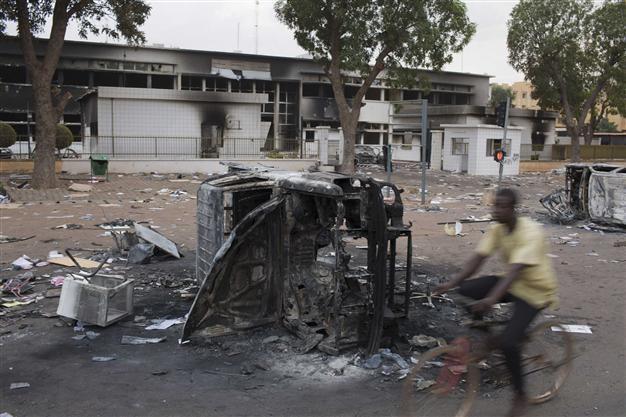Burkina Faso braces for new protest as military names interim leader
OUAGADOUGOU - Agence France-Presse

A man rides a bicycle in front of the burned parliament building in Ouagadougou, capital of Burkina Faso, October 31, 2014. REUTERS Photo
Burkina Faso prepared for another day of mass protest Nov. 2 as opposition and civil society leaders challenged moves by the military to step into the power vacuum left by the ouster of president Blaise Compaore.
The military named a high-ranking officer, Isaac Zida, to lead the country's transition on Saturday, a day after Compaore was forced to resign as plans to extend his 27-year rule exploded into violent demonstrations that saw parliament set ablaze.
Some have drawn parallels with the Arab Spring, with the developments closely watched across a continent where several other veteran heads of state are also trying to cling to power. Zida, who beat out a rival claim by the landlocked west African nation's army chief to lead the transitional government, vowed to work closely with civil society.
But opposition and activist leaders swiftly issued a statement warning the military against a power grab, demanding instead a "democratic and civilian transition".
"The victory born from this popular uprising belongs to the people, and the task of managing the transition falls by right to the people. In no case can it be confiscated by the army," they said in a statement.
They called a new mass rally in the capital Ouagadougou on Sunday at the site now nicknamed "Revolution Square" where up to a million people had gathered earlier this week to demand Compaore's resignation.
The call appeared to have the backing of the African Union, which urged a "civilian-led and consensual transition" through free elections in the former French colony.
Zida, the second in command of the presidential guard, said he had assumed "the responsibilities of head of the transition and of head of state" to ensure a "smooth democratic transition".
The transition will be carried out "together with the other components of national life," he said, referring to the political opposition and civil leaders.
The army's endorsement was signed by General Nabere Honore Traore, who initially said he would himself assume power, a claim Zida had dismissed as "obsolete".
"The aspirations for democratic change" of the Burkina youth "will be neither betrayed, nor disappointed", said Zida, 49.
Speaking on television early Saturday, the military officer also said the ousted president was "in a safe place" and his "safety and well-being are assured".
In neighbouring Ivory Coast the presidency confirmed reports that Compaore, who left Ouagadougou on Friday according to French diplomats, was in the country.
A local resident said he saw a motorcade of around 30 cars heading for a luxury hotel in the Ivorian capital, which is also used as a semi-official residence for foreign dignitaries.
"The services of the President hotel in Yamoussoukro served him (Compaore) dinner yesterday (Friday) and breakfast this morning (Saturday)," according to a hotel employee.
The streets of Ougadougou were calm on Saturday, but residents were already gearing up for fresh protests.
"We are completely against soldiers taking power," Salif Ouedraogo, a 38-year-old insurance agent, told AFP.
"We want a civilian as head of state and tomorrow we are going to regroup at Revoluation Square to say no to military power. Even if it means that there would be bloodshed."
Opposition figures have said around 30 people were killed in Thursday's violence. AFP could only confirm four deaths.
"It's always the same people who are in power. Even though it was us, civilians, who carried out the struggle," said Adama Zongo, a trader.
Others were more positive.
"We should give (Zida) time. Those who don't want a soldier in power, who do they want?" asked Gildas Zongo, a student.
The uprising was sparked by plans to change the constitution to allow Compaore to stand once again for elections next year.
France's President Francois Hollande said Paris would "contribute to calming" the situation in Burkina Faso, while Washington urged "a transfer of power in accordance with the constitution".
Compaore was only 36 when he seized power in a 1987 coup in which his former friend Thomas Sankara was ousted and assassinated.
His bid to hold on to power particularly angered young people in a country where 60 percent of the population of almost 17 million is under 25.
Many have grown up under the leadership of one man and are disillusioned by the establishment that has led a country which is languishing at 181st out of 187 countries on the UN human development index.
Known in colonial times as Upper Volta, the country won independence from France in 1960 and its name was changed to Burkina Faso ("the land of upright men") in 1984.
